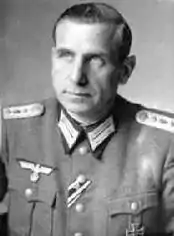Hermann Foertsch
Hermann Foertsch (4 April 1895 – 27 December 1961) was a German general during World War II who held commands at the divisional, corps and army levels. He was a recipient of the Knight's Cross of the Iron Cross of Nazi Germany.
Hermann Foertsch | |
|---|---|
 | |
| Born | 4 April 1895 Drahnow, Deutsch-Krone |
| Died | 27 December 1961 (aged 66) Munich |
| Allegiance | |
| Service/ | Army (Wehrmacht) |
| Years of service | 1913–45 |
| Rank | General of the Infantry |
| Commands held | Chief of General Staff of Army Group F X. Armeekorps 19th Army 1st Army |
| Battles/wars | World War I
|
| Awards | Knight's Cross of the Iron Cross |
| Relations | Friedrich Foertsch (brother) |
Foertsch was tried at the Hostages Trial in 1947. The trial resulted in Foertsch's acquittal because he was a staff officer at the time that the criminal orders were transmitted.
Hostages trial
As a chief of staff for several generals commanding Wehrmacht forces in occupied Greece and Yugoslavia, Foertsch passed on orders to subordinate units to take hostages or conduct reprisals. These orders were deemed criminal by the Tribunal, but staff officers were not considered culpable unless they drafted such criminal orders or made a special effort to distribute them to the troops that carried them out. Citing a lack of evidence of a commission of an unlawful act, the Tribunal acquitted Foertsch of war crimes.[1]
Later life
After his acquittal, Foertsch collaborated with Hans Speidel in the development of concepts for Germany's rearmament many years before the official foundation of the Bundeswehr, the German army, in 1955.[2] In 1950, Foertsch was the leading member of the select group of former Wehrmacht high-ranking officers invited by Chancellor Konrad Adenauer to take part in the conference to discuss West Germany's rearmament (Wiederbewaffnung). The conference resulted in the Himmerod memorandum that contributed to the myth of the "clean Wehrmacht".[3] Foertsch was involved in the establishment of the European anti-communist organisation Interdoc.[4]
Awards and decorations
- Knight's Cross of the Iron Cross on 27 August 1944 as Generalleutnant and commander of 21. Infanterie-Division [5]
References
Citations
- Heberer & Matthäus 2008, p. 99.
- Critchfield, James H. Partners at the Creation: The Men Behind Postwar Germany's Defense and Intelligence Establishments. Naval Institute Press, Annapolis, 2003. p.220.
- Wette 2007, pp. 236–238.
- Scott-Smith p.357.
- Fellgiebel 2000, p. 154.
Bibliography
- Fellgiebel, Walther-Peer (2000) [1986]. Die Träger des Ritterkreuzes des Eisernen Kreuzes 1939–1945 [The Bearers of the Knight's Cross of the Iron Cross 1939–1945] (in German). Friedberg, Germany: Podzun-Pallas. ISBN 978-3-7909-0284-6.
- Heberer, Patricia; Matthäus, Jürgen (2008). Atrocities on Trial: Historical Perspectives on the Politics of Prosecuting War Crimes. University of Nebraska Press. ISBN 978-0-8032-1084-4. Retrieved 2016-01-29.
- Scott-Smith, Giles. Interdoc and West European Psychological Warfare: The American Connection. Intelligence and National Security Vol. 26, Nos. 2–3, 355–376, April–June 2011.
- Wette, Wolfram (2007). The Wehrmacht: History, Myth, Reality. Cambridge, Mass.: Harvard University Press. ISBN 9780674025776.
| Military offices | ||
|---|---|---|
| Preceded by None |
Chief of General Staff of Heeresgruppe F 12 August 1943 - 15 March 1944 |
Succeeded by Generalleutnant August Winter |
| Preceded by Generalmajor Franz Sensfuß |
Commander of 21. Infanterie-Division 28 March 1944 - 22 August 1944 |
Succeeded by Generalmajor Heinrich Götz |
| Preceded by General der Infanterie Friedrich Köchling |
Commander of X. Armeekorps 21 September 1944 - 21 December 1944 |
Succeeded by Generalleutnant Dr. Ing. Dr. Johannes Mayer |
| Preceded by General der Infanterie Siegfried Rasp |
Commander of 19. Armee 15 February 1945 - 28 February 1945 |
Succeeded by General der Infanterie Hans von Obstfelder |
| Preceded by General der Infanterie Hans von Obstfelder |
Commander of 1. Armee 28 February 1945 - 6 May 1945 |
Succeeded by General der Kavallerie Rudolf Koch-Erpach |